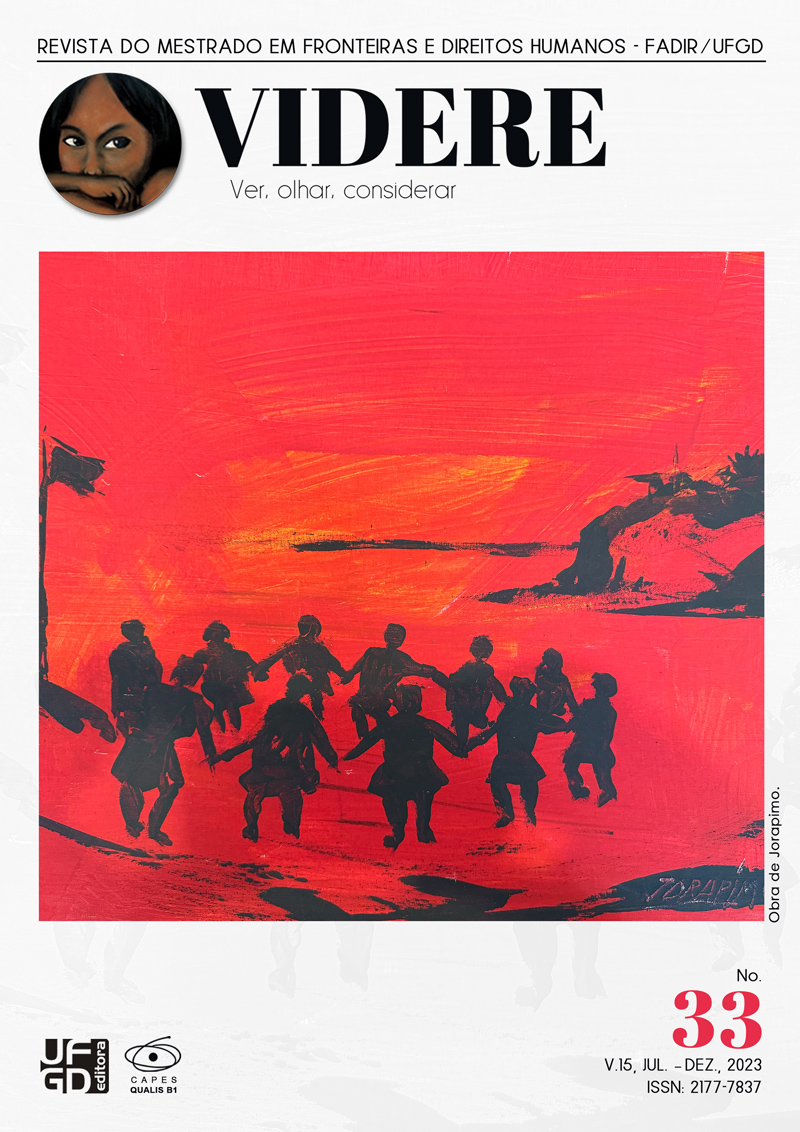Uma análise do direito ao crime na obra de Fiódor Dostoiévski
DOI:
https://doi.org/10.30612/videre.v15i33.17315Keywords:
Homem extraordinário, Super-homem, Nietzsche, CrimeAbstract
Crime e Castigo de Fiódor Dostoiévski, escrito em 1866, com a figura do homem extraordinário, inspirou diversos outros autores, dentre eles, o alemão Friedrich Nietzsche e o Super-homem de Assim falava Zaratustra. Na obra do russo, o homem extraordinário, aquele de inteligência e importância excepcional, justifica suas ações em nome de "um bem maior". Trazendo ao contexto atual, quem seria esse homem extraordinário/Super-homem? Através da análise de fatos da história atual e recente, mostrar-se-á figuras emblemáticas que viram-se como verdadeiros homens extraordinários e tomaram atitudes questionáveis e muitas vezes reprováveis, sob o parâmetro de estarem em busca de um bem maior em prol de suas nações ou até de justiça, mas verdadeiramente somente estavam em uma manifestação de poder e uma queda de braço invisível a fim de demonstrarem uma superioridade imaginária perante os demais membros da sociedade.
Downloads
References
ALBUQUERQUE, José Augusto Guilhon. Michel Foucault e a teoria do poder. Tempo Social; Rev. Sociol. USP, S. Paulo, 7(1-2): 105-110, outubro de 1995. Disponível em: https://www.scielo.br/j/ts/a/B5x4ypvScSqMBjSb6hchGHD/?format=pdf&lang=pt Acesso em: 07 abr. 2023. DOI: https://doi.org/10.1590/ts.v7i1/2.85209
DIETHEF, Carol. Nietzsche and nationalism. History of European Ideas, 14(2), 227–234, 1992 . doi:10.1016/0191-6599(92)90250-g DOI: https://doi.org/10.1016/0191-6599(92)90250-G
DINIZ, Francisco Rômulo Alves; OLIVEIRA, Almeida Alves de. Foucault: do poder disciplinar ao biopoder. Scientia, v. 2, n. 3, p. 01-217, 2013.
DOSTOIÉVSKI, Fiódor. Crime e castigo. Tradução: Yuri Martins de Oliveira. Jandira: Principis, 2020.
FOUCAULT, Michel. Vigiar e Punir. Petrópolis: Vozes, 1987.
GOLIN, Luana Martins. O niilismo em Dostoiévski e Nietzsche. Correlatio, v. 8, n. 16, p. 109-118, 2009. DOI: https://doi.org/10.15603/1677-2644/correlatio.v8n16p109-118
FOGEL, Gilvan. Rodion Raskólnikov ou do pretenso direito ao crime: Apontamentos/itinerário para uma leitura de Crime e Castigo. RUS (São Paulo), v. 12, n. 18, 2021. Disponível em: https://www.revistas.usp.br/rus/article/view/181792. Acesso em: 8 abr. 2023. DOI: https://doi.org/10.11606/issn.2317-4765.rus.2021.181792
HAN, Byung-Chul. O que é poder? Tradução de Gabriel Salvi Philipson. Petrópolis: Vozes, 2019.
NIETZSCHE, Friedrich. Assim falava Zaratustra. Tradução: Erika Patricia Moreira, João Pedro Nodari, revisão de Ana Carolina Morais. Brasil: Pé da Letra, 2021.
PASCHOAL, Antonio Edmilson. A palavra Übermensch nos escritos de Nietzsche. Cadernos Nietzsche, n. 23, p. 105-121, 2007.
PEREIRA, Joseane. Antissemita e ídolo de Hitler: Richard Wagner, o autor da ópera que foi reproduzida em vídeo de Roberto Alvim. 2020. Disponível em: https://aventurasnahistoria.uol.com.br/noticias/reportagem/historia-quem-era-richard-wagner-autor-da-opera-que-foi-reproduzida-em-video-de-roberto-alvim.phtml?utm_source=site&utm_medium=txt&utm_campaign=copypaste Acesso em: 07 abr. 2023.
REISS, Carlos. O legado de Richard Wagner e a ópera a serviço do nazismo. 2021. Disponível em:https://www.plural.jor.br/colunas/holocausto-e-atualidade/o-legado-de-richard-wagner-e-a-opera-a-servico-do-nazismo/
SCHOPENHAUER, Arthur. O mundo como vontade e representação. Tradução: M. F. Sá Correia. Rio de Janeiro: Contraponto, 2001.
SILVA, Esther Maria Veiga da. Relações entre lei, moral e justiça em crime e castigo, de Fiódor Dostoiévsk. Trabalho de Conclusão de Curso, 2021. PUC Campinas.
SOUZA, José Zacarias de. Nietzsche e Dostoiévski: uma possível conexão. 2008. Disponível em: https://www.consciencia.org/nietzsche-e-dostoievski-uma-possivel-conexao Acesso em: 08 abr. 2023.
STATKIEWICZ, Max. “Feeling of Thought”: Nietzsche’s and Dostoevskii’s Experience with Nihilism. Russian Literature, 95, 1–32. 2018 Doi:10.1016/j.ruslit.2018.01.001 DOI: https://doi.org/10.1016/j.ruslit.2018.01.001
Downloads
Published
How to Cite
Issue
Section
License

This work is licensed under a Creative Commons Attribution-NonCommercial-ShareAlike 3.0 Unported License.
Authors must accept the publication rules when submitting the journal, as well as agree to the following terms:
(a) The Editorial Board reserves the right to make changes to the Portuguese language in the originals to maintain the cultured standard of the language, while respecting the style of the authors.
(b) Authors retain the copyright and grant the journal the right to first publication, with the work simultaneously licensed under the Attribution-NonCommercial-ShareAlike 3.0 Brazil (CC BY-NC-SA 3.0 BR) that allows: Share - copy and redistribute the material in any medium or format and Adapt - remix, transform, and create from the material. CC BY-NC-SA 3.0 BR considers the following terms:
- Attribution - You must give the appropriate credit, provide a link to the license and indicate whether changes have been made. You must do so under any reasonable circumstances, but in no way that would suggest that the licensor supports you or your use.
- NonCommercial - You may not use the material for commercial purposes.
- Sharing - If you remix, transform, or create from material, you must distribute your contributions under the same license as the original.
- No additional restrictions - You may not apply legal terms or technological measures that legally restrict others from doing anything that the license permits.
(c) After publication, authors are allowed and encouraged to publish and distribute their work online - in institutional repositories, personal page, social network or other scientific dissemination sites, as long as the publication is not for commercial purposes.



















